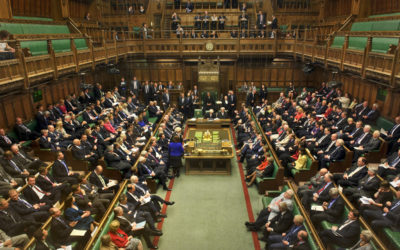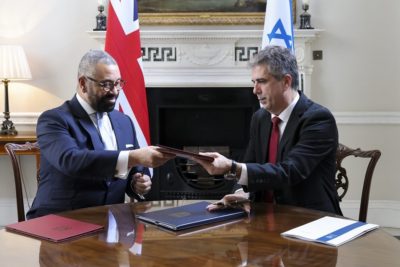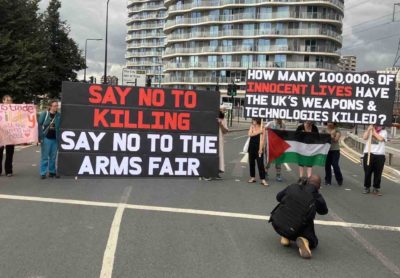Erasing accountability during The Troubles

A new bill focusing on the Troubles is making its way through Parliament. It purports to deliver justice and clarity for those affected by the conflict, but a reading of the bill’s aims and detail, and a look at the tone of the debate around it, suggests it will fall short. Like its international counterpart, the Overseas Operations Act, the bill seems to be much more focused on securing indemnity for the British state. The animating ideologies behind it were particularly apparent in a recent Lords amendment debate, where many beliefs were evident: a thriving sense of British exceptionalism; a fear of a unified Ireland or ongoing Republican feeling among the young; and a willingness by the British establishment to throw its own people under the bus if it shields the state from accountability.
Lethal force
On 24 April 2023 protestors gathered outside the Northern Ireland Office in Belfast to oppose the Northern Ireland Troubles (Legacy and Reconciliation) Bill. Belfast councillor JJ Magee, whose sister Anne was killed by Loyalists in 1976, took part in the protest. He told reporters:
‘We all know full well the full extent of the murderous actions of the British state, who had no qualms about using lethal force against a civilian population whether in Derry, Ballymurphy, Springhill or in the New Lodge.’
For Irish Republicans, the bill is a get-out-of-jail card for the British state for the violence enacted by its security forces during the Troubles. On the face of it, their case seems like a strong one. But the bill’s implications are even wider and a discussion of the broader context is vital.
Protecting the state
In May 2022, Northern Ireland minister Brandon Lewis introduced the bill’s second reading in the Commons. In doing so he brought into relief the establishment view on the legacy of the Troubles. While lauding progress in the North of Ireland to the MPs gather, he said that successive governments had failed to solve some of the major issues associated with the period. He said lengthy legal cases did not advance understanding or deliver justice:
‘The current system is broken; it is delivering neither justice nor information to the vast majority of families. The lengthy, adversarial and complex legal processes do not offer the most effective route to information recovery. Nor do they foster understanding, acknowledgement, and reconciliation.’
The primary ‘victims’ of legal processes, in Lewis’s framing, are state security forces:
‘No longer will our veterans, the vast majority of whom served in Northern Ireland with distinction and honour, have to live in perpetual fear of getting a knock at the door for actions taken in protection of the rule of law many decades ago. With this Bill, our veterans can have the certainty they deserve – and we will fulfill our manifesto pledge to end the cycle of investigations that has plagued too many of them for too long.’
Proposed as an alternative to legal cases is the establishment:
‘…of a new independent commission for information recovery, tasked with carrying out robust, effective and thorough investigations into deaths and serious injuries that occurred during the Troubles for the primary purpose of information recovery.’
At its core, this is what has angered so many of those whose loved ones were killed or injured in the Troubles. There is some truth to the notion that long legal cases about NI era killings have tended to deliver justice and transparency only in a partial sense, but the idea that they should be replaced by a form of archive or talking shop with zero legal power has been felt as an affront by those affected.
A form of conditional immunity will be offered to those who may have committed offences during the Troubles if they give frank testimony. As Lewis has it:
‘To gain immunity, individuals must provide an account to the new commission of their involvement which is true to the best of their knowledge and belief, drawing parallels with aspects of the Truth and Reconciliation Commission implemented in South Africa.’
The bill has come to the Lords as an Ireland-specific version of another, similar set of legislation primarily focused on Iraq and Afghanistan. The Overseas Operations Act came into force in June 2021. As ForcesWatch noted back in 2020, with the exception of hard-line backers in parliament, the press and the veterans community, it was harshly criticised as an incoherent, heavily-politicised law which sought immunity for Britain’s past and future war criminals. But like the Ireland Bill, serious debate on the Overseas Operations Bill was hamstrung by the fact both government and opposition are locked in to a militarist pro-war position in which questioning past and present military operations is off the table.
So, while the bill is often framed as a route by which veteran’s interests can be protected, it is as much an assault on the rights of former soldier’s and their families as it is on Irish victims of the British state. It is also, at its core, a way of safeguarding the state against legal challenge over its conduct during the Troubles.
This legislation is part of a distinct process. State accountability is being pegged back – in this case by the Tories, but with little coherent resistance from Labour – and its coercive power extended through a series of authoritarian bills concerning surveillance, police and security agency powers, with press freedom and the right to protest all affected. It is perfectly possible to argue that the two acts concerning the past and future conduct of military occupation and war are one strut of a broader effort by the British state to inoculate itself against scrutiny and legal challenge.
The Critics
Much like the Overseas Operations Act, there are numerous influential critics of the Northern Ireland Troubles Bill. Amnesty International’s view is particularly blunt:
‘Murder is murder, whether it happened 5, 15 or 50 years ago in Northern Ireland or anywhere else. Torture is a crime with absolute prohibition under international law. The UK Government is trying to let people off with murder, torture and other serious crimes through the Northern Ireland Troubles (Legacy and Reconciliation) Bill.’
The Centre for Military Justice (CMJ) released its own briefing which, in part, addressed claims made by supporters of both the Overseas Operations Bill and the Ireland Bill, that the legislations seeks to protect the military community:
‘The Northern Ireland Troubles (Legacy & Reconciliation) Bill has enormous implications for those that served in Northern Ireland. Presented as in the interests of the armed forces, it is not.’
As CMJ points out, rather than just ending of legal cases by Republican families, it also effectively closes outstanding cases of British soldiers killed by nationalist and other paramilitaries:
‘Bereaved military families and those that lost friends and colleagues have everything to lose. The unsolved murders or serious crimes committed against more than 200 service personnel will immediately close if this Bill passes.’
Like the Overseas Operations Act, all it does is give the impression that the forces are trying to defend the indefensible.
CMJ also placed the bill in the context of the Government’s wider effort to diminish the scope of human rights and legal recourse in the UK:
‘The Government must stop pouring fuel on the fires of tabloid campaigns and elderly men’s fears. Combined with the Bill of Rights, that will repeal the Human Rights Act, the impact will be devastating for everyone that lived, worked or served in Northern Ireland.’
So, while the bill is often framed as a route by which veteran’s interests can be protected, it is as much an assault on the rights of former soldier’s and their families as it is on Irish victims of the British state. It is also, at its core, a way of safeguarding the state against legal challenge over its conduct during the Troubles.
Criticism has also come from overseas. In January 2023, a cross-party group of US congressmen warned the laws would undermine the Good Friday Agreement (GFA). While in January the influential Pat Finucane Centre, an Irish legal NGO focussing on the Troubles, told reporters the bill:
‘…flies in the face of the European Court of Human Rights and all recognised international human rights.’
Adding that the legislation was an “insult to our intelligence”.
Debate in the Lords
Debates in the Lords have featured several interesting claims about the bill and the immunity promised in it. Several of the amendments concern whether those granted immunity glorify terrorism, though it is not clear to what extent this involves a form of enforced disavowal of Irish culture and identity. Indeed, anti-Republicanism seemed to be a powerful animating force behind the Lord’s treatment of the bill, with some of the arguments verging on the bizarre. The Democratic Unionist Party’s Lord Weir said:
‘It is also the case that the glorification of terrorism per se is wrong. It does not matter whether it is a glorification of republican or loyalist terrorism, or terrorism from another part of the world; it is deeply wrong.’
Which seems rather subjective if you were to apply it to universally to countries like the United States or modern South Africa, for example, which were founded on insurgencies and civil war. Weir then embellishes his point with a very strange example:
‘On another occasion very recently, a friend of mine sent me a screenshot of a product that is available not on some niche website or from a paramilitary-linked group, but from a mainstream, UK-wide online shopping facility. It was a card you could buy for £3.50. It had a picture of someone in paramilitary uniform, wearing a balaclava and a beret, and had the phrase “Tiocfaidh Ár Lá” on it. Underneath it said, “Happy Mother’s Day”, which is quite chilling. And that is the problem. We are, unfortunately, reaching a point where there is a normalisation of the glorification of terrorism, so I believe that these are important steps to take and I hope that the Committee can unite around these amendments.’
Certainly, not every point made was as partisan or shakily evidenced. But a vocal current in the Lords seemed to struggle with the nuances:
Labour’s Lord Murphy said:
‘I have never really agreed with the phrase that one man’s terrorist is another man’s freedom fighter. There is never any sort of justification for killing innocent people, particularly women and children and people going about their business. The only killing I suppose you can justify—and even that is doubtful—is in wars, if you have to do it in self-defence or whatever.’
His voting record as an MP, it should be noted, is of strident support for the Iraq War, as well as opposition to investigations into it, and support for miliary action generally.
While Lord Caine turned his attention to the band Kneecap, whose performance he had been disturbed by:
‘I recall last year that an Irish language rap group called Kneecap, which noble Lords will understand has a specific meaning in Northern Ireland, performed at a festival where they even unveiled a mural depicting a burning police car. It is horrendous.’
Some of what underpinned the debate in the Lords was clearly a justifiable concern about glamourising violence. But this was struck through with other currents. A fear of, or contempt for, Irish Republican culture, particularly its popularity among young people, was in evidence. But also, the same partisan, highly ideological inability to reflect on the violence of the British state, whether in Ireland or elsewhere, which has coloured the new laws in Ireland and overseas operations. We note the UK government and establishment is hardly immune to celebrating and glorifying its violent, martial past and present.
Closing doors
The Northern Ireland Troubles Bill is a damaging, self-serving piece of legislation that must be understood as an attempt to protect the British state against accountability and transparency. Parliamentary debates around the bill also show a deep fear of the politics which call for a unified Ireland. This powerful sense of coloniality and British exceptionalism undermines the claim that the bill – or the act that would result from it – would deliver a just settlement.
Additionally, the bill’s shotgun approach closes cases of British soldiers being murdered, alongside those of Republican and other victims killed by British forces or the police. How this can possibly square with claims by supporters of the bill that it will deliver for veterans and military families is unclear. But it suggests that what really drives the bill is not a concern for ‘Our Boys’ at all, but rather indemnifying the state against legal challenge at any cost, even to those who served in the conflict.
See more: human rights, legislation & policy, Northern Ireland, UK Parliament, democracy
Like what you read?
> Sign up for our newsletter or blog notifications
> Support our work – from just £2 a month









